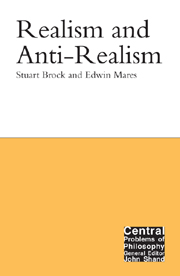2 - Local realism and anti-realism: the existence axis
from Part I
Summary
Very few of us are global anti-realists. Most of us believe that there are concrete particulars that exist independently of our minds and our conceptual schemes. But very few of us are global realists either. Whether or not some entities – entities such as colours, quarks, moral qualities, numbers, possible worlds, and fictional characters – are real is a controversial matter. To borrow a slogan from a famous philosopher, when it comes to questions about whether such entities are real, most of us are pickers and choosers, some-but-only someists – that is, most of us are local realists about some entities, but local anti-realists about others.
In Chapters 2 and 3 we shall examine the various considerations that might motivate one to be a realist or anti-realist about a particular domain, without requiring that one be a realist or anti-realist globally. Realists about a realm of Fs will motivate their position first by demonstrating that Fs exist, and will only then proceed to argue that Fs are not merely objects of our own manufacture. Let us therefore call someone who argues that Fs exist a “minimal realist” about Fs. And let us call someone who also argues that such entities exist independently of us a “robust realist” about Fs. In this chapter we examine the existence axis, and therefore aim to evaluate minimal realism and the anti-realist alternatives to it. Consequently, whenever we talk simply of realism or anti-realism in this chapter, we shall be talking about minimal realism and anti-minimal realism.
- Type
- Chapter
- Information
- Realism and Anti-Realism , pp. 11 - 33Publisher: Acumen PublishingPrint publication year: 2007



